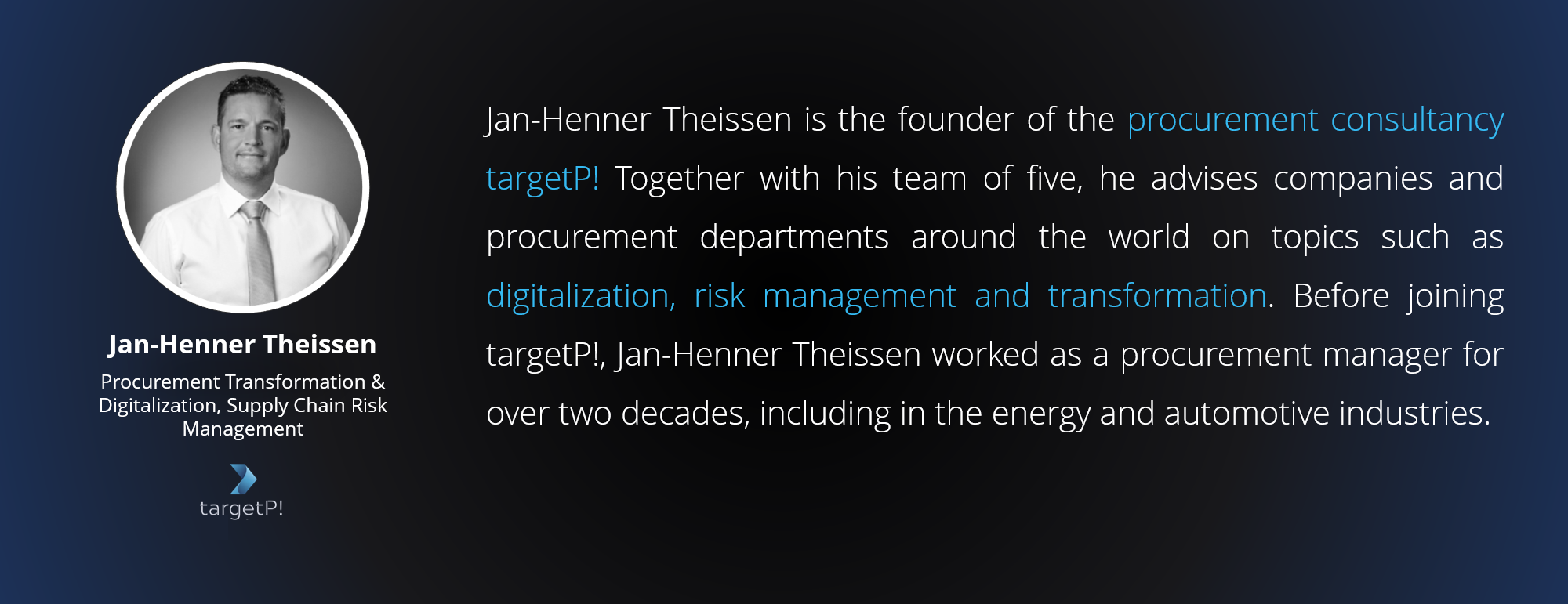Existing customer? Login
Interview
October 31st, 2022
Interview with Jan-Henner Theissen, founder of targetP! - Part 2
 Rubina Hatziparassidis
Rubina Hatziparassidis
Uncertain times require targeted measures - especially in the field of procurement. Jan-Henner Theissen, founder and CEO of the procurement consultancy targetP!, knows exactly what those measures should look like. In this second part of the interview, he tells us why it is not too late for good risk management and what he has to say about the upcoming Supply Chain Act.

What characterizes modern risk management?
Anyone who set up a risk management system ten or twelve years ago relied heavily on the motivation of employees, credit agencies and the resulting bogus security, as well as information from various Excel lists they had made themselves. A lot of it was ad hoc and experimental; it was not always effective. Nowadays, on the other hand, you have the ability to buy digital solutions that monitor the supply chain, guide you 24/7, and give you a whole new level of data access. As a result, I can ramp up good risk management much faster today and start making a profit from day one.
Of course, however, this is only one component. Equally important, or almost more important, are sensitized and well-trained employees, a vibrant risk culture, and agile structures in which risk prevention is methodically established. This is the only way I can react quickly and systematically in the event of a crisis.
Thus, this does not mean either digitization or risk management, but much more both hand in hand?
Definitely. For me, the topic of risk management is and remains one of the first areas in procurement where the term digitization can be used meaningfully. This is really the first time that humans and machines have joined forces, and I can say that this will add a new tool to the organization that will enable me to do something that I can't do with humans - in other words, Big Data. And if, on the second track, I sensitize the employees to the topic, I will very quickly have a risk management system that is no longer based on excel lists or self-designed databases, but that really seeks this collaboration from the very beginning. This is the only way to create digital procurement, and the only way to further develop the organization.
Now, on top of that, the new "Act on Corporate Due Diligence in Supply Chains" is coming on January 1, 2023. How do you think this will affect the procurement department, which is already operating in crisis mode?
The EU Supply Chain Act reminds me a lot of the Conflict Minerals Act that was introduced in the US in 2013. Similar to the Supply Chain Act, it was also about making the supply chain transparent and taking a look: Where do I have any human rights violations along my supply chain? Or violations against environmental protection guidelines or the habitat of humans and animals? From this perspective, the Supply Chain Act is therefore only a logical consequence of various initiatives that have already been launched in different countries in recent years.
So that means you are rather optimistic about the new supply chain law?
There will certainly be a noticeable impact on companies, no question about it. On the one hand, as a company, not just as a procurement organization, I will certainly have to invest money to implement the topic. That includes consulting expertise as well as digital solutions. On the other hand, you are forced to deal with topics that may have fallen by the wayside in the past - risk management being a keyword. On the other hand, mid-sized organizations in particular are still struggling mightily to really understand their supply chain. And now they finally have the chance to create transparency in their supply chain. Thanks in part to this "legal club" up their sleeve.
But isn't the law coming at exactly the wrong time now?
Let me put it this way. The supply chain law has been called for years now and if I want to stay in business, if I want to continue to be listed with my customer, I simply have to do it now. Of course, in doing so, the law also comes at the wrong time for some. On the other hand, if I'm currently dealing with big issues like risk management anyway, the Supply Chain Act gives me one thing directly that complements that issue wonderfully. Of course, this will also have an impact on my day-to-day business, which is stressful enough at the moment; but at the same time, it will also have a positive impact if I tackle both topics together now and thus save myself double the work over the next few years.
Finally, do you have any tips or "quick wins" that you would like to pass on to those responsible for procurement?
Even if this may seem somewhat counterintuitive against the backdrop of limited resources, more staff within the organization would certainly do many good at the current time. I know from my many years as a procurement manager that good staff doesn't just appear out of the blue. But I do believe that we are in a situation where additional staff and also additional digital solutions lead to work results getting better at a high pace. Despite additional costs, good tracking of all planned and launched optimization measures is also incredibly important. In many purchasing organizations, there are already great ideas for this, but there is a lack of implementation. But here, too, there are great digital solutions on the market that help me implement measures quickly and professionally. And that in turn creates room for maneuver, so that topics such as cost reduction or production relocations can be tackled on this basis.
Take a look at Jan-Henner Theissen's book: Find the book

How SCALUE can help you? Schedule a free demo now!
Learn more on our blog: Get More Insights
Follow us on LinkedIn: Get more Content